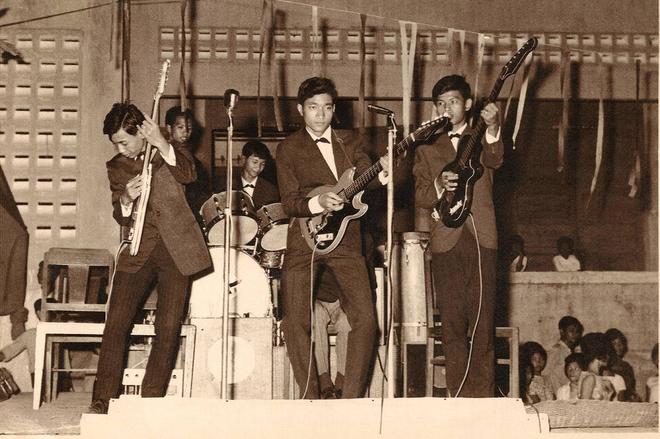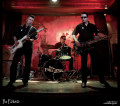
Posted on Apr 28 2015 09:44 PM
Wall Street Journal
Arts Music
What the Khmer Rouge Did to Rock
The new documentary “Don’t Think I’ve Forgotten: Cambodia’s Lost Rock and Roll” recounts the fate of Cambodian musicians, including the band Baksey Cham Krong.

By Jim Fusilli
April 27, 2015 5:46 p.m. ET
New York
It was a bittersweet concert, but how could it be otherwise? Veteran Cambodian musicians were celebrating unexpected recognition—in the form of the new documentary “Don’t Think I’ve Forgotten: Cambodia’s Lost Rock and Roll”—but were shadowed, as always, by enormous loss. When brothers Mol Kagnol and Mol Kamach of the guitar band Baksey Cham Krong took the stage on Friday night at City Winery here, they were likely to remember at least 20 family members, including their musician brothers, who had been executed or left to die some four decades ago by the Communist mass murderers known as the Khmer Rouge.
Directed by John Pirozzi, “Don’t Think I’ve Forgotten” focuses on the vital music scene in Phnom Penh, the country’s cosmopolitan capital in the years following Cambodian independence from France in late 1953 until the Khmer Rouge’s arrival in 1975. The music drew on Western influences without ever stooping to pure imitation. Sinn Sisamouth, considered the country’s greatest singer and songwriter, moved away from crooning with an orchestra at his back to embrace rock instrumentation. Meanwhile, Baksey Cham Krong was playing guitar-based surf rock, with Mol Kagnol reflecting the inspiration of Dick Dale, Hank Marvin of the Shadows, Bob Bogle of the Ventures and others. “I had a nickname,” he said with a modest smile during a conversation before the show: “The Hank Marvin of Cambodia.”
By 1965, the U.S. military was in Vietnam, with troops stationed near the Cambodian border. Musicians in Phnom Penh, some of whom learned of Western music via records brought in from Paris, now heard American rock, blues, soul and pop via a branch of Armed Forces Radio. Superstars emerged: Ros Serey Sothea, who Cambodia’s ruler, Norodom Sihanouk, called “the golden voice of the royal capital”; the provocative Pen Ran; and Yol Aularong, a hard-rocking protest singer, among them.
All three, along with Sinn Sisamouth, were executed or left to die by the Khmer Rouge in the Cambodian genocide that, among other atrocities, sought to eliminate artistic and cultural progressives in an effort to de-Westernize the nation. It is estimated that some 1.7 million people, or about 21% of the population, were killed by the followers of the Communist regime, which fell in 1979. Baksey Cham Krong’s Mol Kamach escaped to Paris via Vietnam; his younger brother Kagnol was stationed in Texas, a member of Cambodia’s Air Force.
Mr. Pirozzi first visited Cambodia while working on “City of Ghosts,” a 2003 film directed by Matt Dillon. When he returned to the States, a friend sent him a compilation album of Cambodian rock music. Doubly inspired, he set to work on what became “Don’t Think I’ve Forgotten.” (For a schedule of screenings across the U.S., visit www.dtifcambodia.com.) He contends the country’s music scene was special—a vital force in a rapidly changing nation—and is proved correct by the film and the soundtrack album, which includes instructive liner notes. Though the film succeeds in keeping the focus on the music and musicians, horror becomes reality as the conflict in Vietnam crosses the Cambodian border. Memories linger of the film’s harrowing images, made more poignant by the joy they displace: a man running with a rifle in one hand, an electric guitar in the other; Phnom Penh as a ghost town with record shops destroyed and instruments abandoned; and musicians who had been severed from family, friends and the rewards of earlier achievements now subordinate to a corrupt political creed.
At the concert here, a spirit of resilience was an unspoken undercurrent, but earlier in the day, the Mol brothers addressed the meaning of the event: They were reuniting through music. “I was moved to tears when I saw my brother and heard his guitar,” said Mol Kamach. “When Kagnol was in the States and I was in France, for me it was like missing an arm.” They remembered their brother Samel, who wrote their top hits before dying at the hands of the Khmer Rouge.
With fellow original member Samley Hong, the surviving musicians of Baksey Cham Krong played a few of its hits, with Kagnol Mol’s twangy guitar as the centerpiece. But the house band was tentative in its support and the hybrid music failed to coalesce. In a tuxedo and bow tie, Sinn Sethakol sang his grandfather’s hits with a starched formality that was somehow charming. The music came to life when Chhom Nimol of the Los Angeles-based band Dengue Fever delivered hits by the remarkable Ros and the fiery Pen, and Touch Seang Tana, a surviving member of the late ’60s Cambodian hard-rock proponents Drakkar, performed its tunes with something close to abandon. With Ms. Chhom and Mr. Touch out front, the music, at least temporarily, superseded dark memories and paid bright homage to the ghosts who inhabit Cambodia’s soul.
Mr. Fusilli is the Journal’s rock and pop music critic. Email him at jfusilli@wsj.com and follow him on Twitter @wsjrock.
—
Ivan
Lords of Atlantis on Facebook
The Madeira Official Website
The Madeira on Facebook
The Blair-Pongracic Band on Facebook
The Space Cossacks on Facebook
The Madeira Channel on YouTube
Last edited: Apr 28, 2015 21:46:30





































